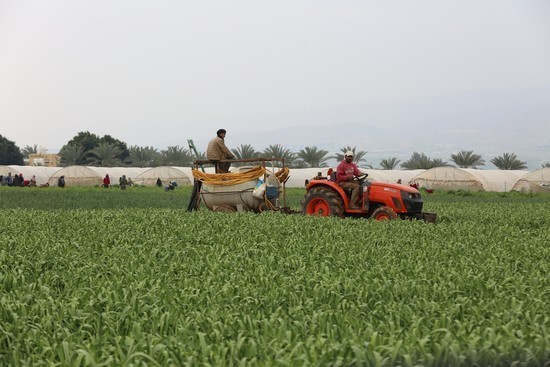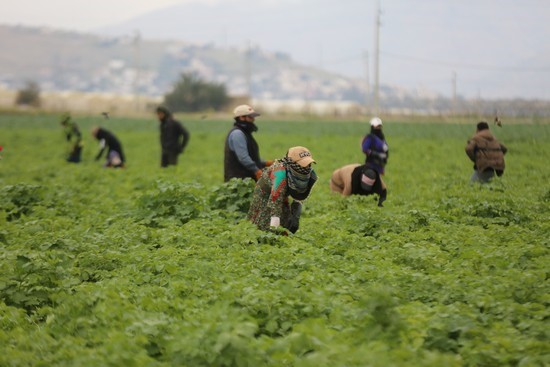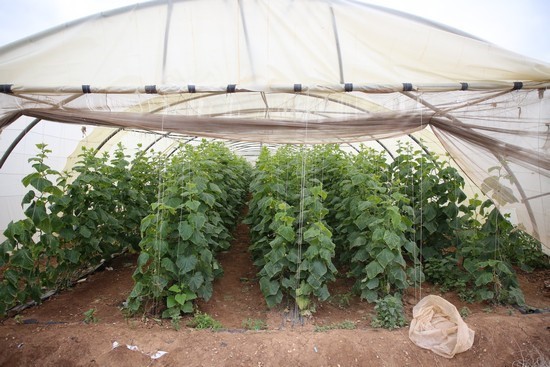Eliminating the middleman — who typically takes a large
share of the farmer’s revenue, underpays for bulk produce, and sells it to food
hubs at higher rates — between
Jordanian farmers and retailers in a
business-to-business model is Ghoorcom’s main goal.
اضافة اعلان
This
local social enterprise uses technology to apply
integrated and optimized supply chain solutions using multi-payment gateways
that assist farmers and retailers maximize benefit. The solutions allow farmers
to receive more for their product directly from buyers, while buyers enjoy a cheaper
price.
As for the produce, it remains fresher due to the
elimination of unreliable distribution methods.

“Technology is a means to an end, not an end in itself,”
said Mohammed Oqeili, the founder and chief executive officer of
Ghoorcom. “To
level the playing field and encourage transparency and fair trade for all
parties, we needed to discover a way outside the traditional nexus and supply
chain approach. Typically, a farmer’s crop passes through numerous layers of
middlemen, with each layer’s price increasing without adding commensurate
value,” he explained.

Oqeili carried out preliminary research, starting with
market validation and research-based conceptualization prior to Ghoorcom’s
launch in 2018. He enlisted the help of two additional field researchers in
Jordan to answer several questions, including the production of local produce
in tonnes, distribution, exports,
self-sufficiency, and harvest seasons. The
research also entailed international agricultural commodities such as the stock
markets of corn, wheat, and legumes and how they would affect the agriculture
sector in Jordan.
Through his findings, Oqeili launched the e-bidding online
platform and began connecting food hubs such as restaurants, hotels, malls, and
grocery stores directly to local farmers using a full-set comprehensive online
solution that includes product choice, delivery, and payment.

“I had so many acquaintances who work in the agricultural
field. So, I was familiar with the fact that every harvest they invest their
resources, money, and time in — and suffer the physical exertions while taking
care of — (that they) still wouldn’t receive satisfactory financial returns,”
he said.
Oqeili’s background in finance also helped him start the
initiative. “I had a career in finance, and I was interested in stock market
analysis. It’s all about reading the meaning behind the numbers and how
everything is supply and demand at its core.”
Ghoorcom received support from the EU through
Oxfam’s
regional project “MedUP!”. “They helped push the platform’s development in
different phases: providing technical support, capacity building, and
institutional knowledge. This all resulted in customized-for-locals,
sophisticated supply chain algorithms that were developed in-house,” said
Oqeili.

The app has native language support, a multi-payment gateway
that includes cash, e-wallet, and bank account, and a consistent delivery
system to make transactions easier for farmers.
While previously the technology gap could be seen as a
struggle, the pandemic forced digitization to gain momentum in all sectors,
including agriculture. Through this digital boost, Ghoorcom was able to support
farmers to be independent through the lockdown — which left farmers in a lurch
even though their crops were ready for harvest — as transport and markets were
closed.

For the time being, Ghoorcom’s main destination markets are
Amman, Zarqa, and Irbid. Approximately 200 farmers have already signed up and
are active on the platform, which began with oranges and now sells seasonal produce.
Oqeili’s vision is to expand across the
Middle East, for
more people to believe in Ghoorcom’s capability to add value to the market and
bring traceability to their supply chains. Through these goals, Ghoorcom hopes
that there will be a path toward a more accessible, conscious, and sustainable
food system.
Read more Around Jordan
Jordan news










